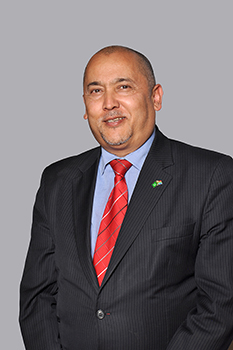Latest News Archive
Please select Category, Year, and then Month to display items
12 January 2024
|
Story Nonsindiswe Qwabe
|
Photo Sonia Small
 Since joining the UFS in 2008, Dr Grey Magaiza has worked extensively on approaches that can foster the socio-economic transformation of societies.
Since joining the UFS in 2008, Dr Grey Magaiza has worked extensively on approaches that can foster the socio-economic transformation of societies.
“The future should be one where communities can decide on their development agenda and futures. That’s the most important for me.” Dr Grey Magaiza, Deputy Director of the Centre for Gender and Africa Studies (CGAS) and Head of the Community Development programme on the Qwaqwa Campus, is passionate about capacitating communities to be agents of change and advancement. His vision for the future emphasises the empowerment of communities to take charge of their development by actively participating in decision making and the implementation of development projects that can improve their lives.
Since joining the UFS in 2008, Dr Magaiza has worked extensively on approaches that can foster the socio-economic transformation of societies. Over the years, he has crafted his research speciality into one that he is most proud of – being an interdisciplinary scientist immersed in the development of communities.
“I’m in a fortunate position of researching what I like. I say ‘fortunate’, because I’ve taken the time to understand what I’m passionate about, which is the overall field of rural livelihoods and livelihood futures – in short, community development. My research starts from an engaged university, understanding the elements that a university must use to enhance transformation and relevance to its immediate community in terms of development.”
One of the ways he has done this is by looking at social entrepreneurship as a development approach for young people in a rural setting. Through workshops with non-profit and civic organisations in Qwaqwa, Dr Magaiza has been helping these organisations to map out their needs and actively meet them through the involvement and support of external role players.
“We understand that communities are part of the national development agenda, but even that national agenda respects community knowledge and intentions and allows communities to shape their identity. A critical enabler of this is community organising. You bring back the capacity in communities to have dialogues on issues affecting them as spaces for engagement, knowledge exchange, and for people to just talk about their way forward.”
By enabling communities to define their development agenda, they can address their specific needs, challenges, and aspirations, he said. “When I look at livelihood futures, it’s quite an exciting aspect of my work – it’s like looking into a fortune tellers’ globe, because you’re not deciding for communities what they should do, but the communities themselves take those decisions.”
Meet our Councillor Ryland Fisher - media expert, political commentator, art lover
2016-07-13

Ryland Fisher
Photo: Johan Roux
With more than 30 years’ experience in the media industry as former editor of the Cape Times and New Age, as well as assistant editor of the Sunday Times, and thanks to a profound understanding of the political situation in South Africa, Ryland Fisher was an obvious choice to serve on the Council of the University of the Free State.
Racial issues and diversity
He was born and bred in Cape Town, and studied Journalism at Rhodes University before the political situation in South Africa interrupted his studies. Despite this, Ryland has made a deep impression on the academy. Among others, he presented lectures on racial issues and diversity at the University of Cape Town, the Institute for the Advancement of Journalism in Johannesburg, Emory University in Atlanta, and Ohio University.
Author and editor
Ryland has published two books, Race in 2007 and Making the Media Work for You in 2002, and was editor of the Official Opus on Nelson Mandela.
He was elected to the UFS Council in 2015. Ryland believes that his particular background and understanding of the media industry, as well as race and diversity issues, will make a valuable contribution to the Council.
Politics, media, and entrepreneurship
"I have proven experience in politics, the media, and entrepreneurship. I often lecture on media and social transformation. I believe this offers me a unique view that could benefit Council," he says.
Ryland has a particular enthusiasm for the arts, and is executive chairman of the Cape Town Festival. He has been married for over 30 years, and his three daughters lie close to his heart.